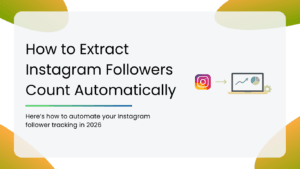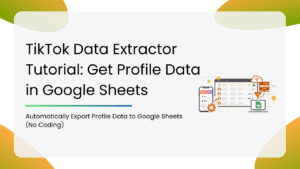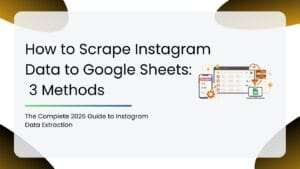To stay ahead in the game in 2025 means being smarter, quicker, and more strategic, and that’s where AI competitor analysis tools have your back. Whether you’re a new firm, an up-and-coming brand, or a large-scale enterprise, the right tools will help you ride the waves of market trends, keep tabs on your competitors, and find opportunities before your competitors do.
In this blog, we’ll explore the must-have AI tools to keep you ahead this year.
What Makes A Competitor Analysis Tool The Best?
- Real-Time Data Insights – The best tools offer up-to-date data tracking across web traffic, SEO, social media, ads, and content trends, so you always have the latest competitive intelligence.
- Multi-Channel Monitoring – A top tool should monitor competitors across multiple platforms – search engines, social media, paid ads, and websites, to give a full picture competitive landscape.
- User-Friendly Interface – Even powerful features are only valuable if they’re accessible. A clean dashboard and easy navigation make the analysis process efficient for marketers and strategists at any level.
- Integrations with Other Tools – The best AI tools work seamlessly with your existing tech stack, whether it’s Google Analytics, CRM platforms, or social media managers, for enhanced decision-making.
- Scalability and Affordability – As your business grows, your competitor analysis tool should scale with you, providing more insights without drastically increasing cost or complexity.
Types of AI Competitor Analysis Tools
- SEO and Keyword Research Tools – These tools help you analyze competitors’ search engine performance, including their top-ranking keywords, backlinks, and content strategies. They reveal gaps in your own SEO efforts by showing which terms competitors target and how they generate organic traffic.
- Market and Competitive Intelligence Platforms – These platforms watch what competitors are doing in business, like getting funding, launching products, and making big changes. They give useful information that helps businesses compare their performance, predict market trends, and respond to what rivals are doing with instant alerts.
- Web and Traffic Analysis Tools – These tools estimate traffic on competitors’ websites, user activity, and referring websites to understand how they attract audiences. They also reveal technologies competitors employ, like CMS platforms or advertising networks, and provide technical information.
- Social Media and Content Check Tools – These resources examine what content and social media updates work for competitors. They find patterns and successful campaigns. They help brands know what works for people, like popular posts and influencer collaborations.
- Monitoring Tools and Websites for Changes – These tools track competitors’ sites for changes in real time, such as price changes, product additions, and e-mail campaigns. By notifying users of even minor changes, they enable speedy responses to competitors’ actions.
Steps To Conduct a Competitor Analysis
- Identify Your Major Players – Start with a listing of both direct (same service/product) and indirect competitors (targeting the same market but otherwise). List new entrants and disruptive startups within your category.
- Examine Their Products and Services – Do some research into what they have, what it’s worth, and why it’s so desirable. Pay attention to special features, negatives, and reviews to compare them in the marketplace.
- Evaluate Their Marketing Strategy – Review their SEO rankings, content marketing, email marketing, advertisement plans, and social media page.
- Observe Their Audience Interaction – Notice how consumers interact with them online, through reviews, social media posts, forum threads, and ratings. This indicates areas of concern, happiness levels, and sentiment towards the band.
- Fill Gaps and Create Opportunities – Now, compare what you have found with your own company. Do there exist underpenetrated niches? Do you serve a customer’s pain point better? Innovate, differentiate, and refine your approach based on these findings.
Top Competitor Analysis Tools at a Glance
| Tool Name | Best For | Pricing | Free Trial |
| Web Traffic and Social Metrics Add-on For Google Slides | Creating presentation-ready competitor traffic and social media reports in Google Slides | Credit-based: $10 for 50 credits, $20 for 200 credits, $50 for 650 credits, Custom pricing for 650+ credits | Yes – 10 credits free |
| SendView | Email tracking & analytics | Standard- $69/month, Pro- $99/month, Ultimate- $169/month, | Yes |
| SpyFu | Competitor keyword research | Basic- $39/month, Professional- $79/month | Yes (7-day) |
| Owler | Company insights & news | Community- Free, Pro- $39/month | Yes |
| BuzzSumo | Content research & influencer tracking | Content creation- $199/month, PR & Coms- $299/month, Suite- $499/month, Enterprise- $999/month | Yes |
| Similarweb | Website traffic & analytics | Contact Sales | Yes |
| VisualPing | Website change monitoring | Starter- $10/month, Personal 5K- $25/month, Personal 10K- $50/month, Business- $100/month | Yes |
| Conductor | SEO & content optimization | Customized pricing | Yes |
| Ahrefs | Backlink & SEO analysis | Lite- $129/month, Standard- $249/month, Advanced- $449/month, Enterprise- $1499/month. | – |
| SEMRush | SEO, PPC & content marketing | Price- $165.15/month | Yes |
| Kompyte | Competitive intelligence automation | Customized pricing. Plans – Essential, Professional, and Unlimited | Yes (Demo) |
| Crayon | Market & competitive intelligence | Custom pricing (Enterprise plans) | Yes (Demo) |
| Klue | Competitive enablement & insights | Custom pricing (B2B-focused) | Yes (Demo) |
| Phlanx | Instagram influencer analytics | Basic- $39/month, Premium- $60/month, Business- $90/month. | Yes |
| HypeAuditor | Instagram & TikTok fraud detection | Contact Sales | Yes |
| Sprout Social | Social media management & analytics | Standard- $199/month, Professional-$299/month, Advanced-$399/month, Enterprise- Custom | Yes |
| Wappalyzer | Tech stack detection | Pro- $250/month, Business- $450/month, Enterprise- $850+/month. | Yes |
Table of Contents
| 1. Web Traffic and Social Metrics Add-on For Google Slides |
| 2. SendView |
| 3. SpyFu |
| 4. Owler |
| 5. BuzzSumo |
| 6. Similarweb |
| 7. VisualPing |
| 8. Conductor |
| 9. Ahrefs |
| 10. SEMRush |
| 11. Kompyte |
| 12. Crayon |
| 13. Klue |
| 14. Phlanx |
| 15. HypeAuditor |
| 16. Sprout Social |
| 17. Wappalyzer |
1. Web Traffic and Social Metrics Add-On for Google Slides
If you’ve ever wasted time copy-pasting website stats and social media numbers into slides, this tool is about to change your workflow. The Web Traffic and Social Metrics Add-On for Google Slides lets you auto-populate presentation-ready slides with traffic stats, source breakdowns, top countries, and social media metrics, no dashboards or spreadsheets needed. Ideal for competitive benchmarking, pitch decks, or executive reporting, it brings powerful insights directly where they’re needed: in your slides.
Key Features:
- Direct Google Slides Integration: Seamlessly populates 4 well-designed slides with competitor traffic and social media data.
- Powered by Similarweb + Live Social Lookups: Access trusted traffic data and up-to-date follower counts for Facebook, Instagram, LinkedIn, and TikTok.
- Auto-Population with One Click: No formatting or manual data entry, just paste up to 4 URLs and let it run.
- Broad Benchmarking Support: Analyze multiple competitor domains at once for fast, side-by-side comparisons.
- Ideal for Reports & Presentations: Save hours on manual work and go from research to boardroom-ready in minutes.
Pros:
- Saves Time: No switching between dashboards, APIs, or spreadsheets.
- Presentation-Ready: Pre-formatted slides mean zero design hassle.
- Flexible Pricing: Pay only for what you use, and there are no monthly lock-ins.
- Multi-Use Case Friendly: Works for marketers, consultants, analysts, and sales teams alike.
Cons:
- Google Slides Dependency: Only useful if your workflow involves Google Slides.
- Limited URLs per Run: Maximum of 4 URLs per analysis session, which may be a limitation for larger projects.
For a detailed tutorial on how to use this tool, you can also refer to the linked video:-
2. SendView
SendView is an email marketing software used by marketers to view and comprehend their competitors’ email marketing campaigns. Unlike standard inboxes, SendView provides a full platform for tracking and comprehending email campaigns.
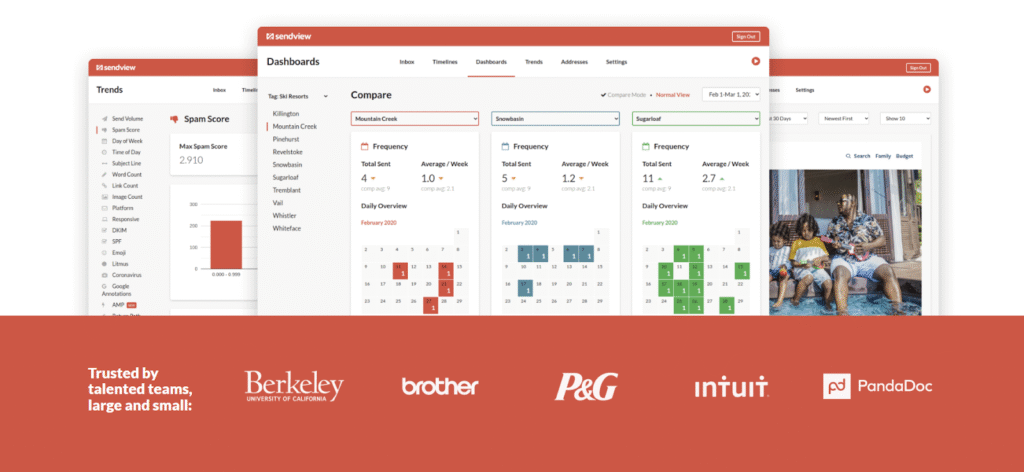
Key Features
- Personalized Tracking Email Addresses: Create a unique email address for each competitor so that you can subscribe to their emails without clogging your personal inbox.
- Campaign insights: Examine emails for spam scores, email service providers, content calendars, send times, technology used, and source codes as well.
- Company Dashboards: Visualize and compare competitors’ strategies, such as content calendars and word clouds.
- Trend Reports: Track industry developments like average send times, ESP use, and tech adoption.
- Campaign Timelines: Monitor email sequences and programs to see how competitors’ campaign flows.
- Alerts: Get alerted when your competitors alter strategy, i.e., change ESPs or transmit frequency changes.
- Favorite Board: Bookmark and save campaigns that you find interesting to reuse later.
- Search and Filter Options: You can search and filter campaigns on a number of parameters such as ESP, send time, etc.
Pros
- Customizable Tracking: Complete control over which firms to track and how, making customized competitor analysis easier.
- User-Friendly Interface: Made for marketers, hence it is simple to use and find important information.
- In-depth Study: Provides in-depth insight into competitors’ email strategies, beyond what regular inboxes reveal.
Cons
- Initial Data Collection: It can take a few weeks to collect enough data for effective analysis.
- Manual Data Uploads: You must manually upload send/open data, which might be less convenient compared to platforms directly connecting to ESPs.
Review
A sleek email intelligence platform that reveals competitors’ email strategies. The campaign tracking is impressively detailed, showing send frequency and design patterns. While the interface is user-friendly, the pricing may be on the higher end for smaller businesses.
3. SpyFu
SpyFu is a competitor tool that helps marketers learn about their competitors and show them how to outperform them in SEO and PPC campaigns.
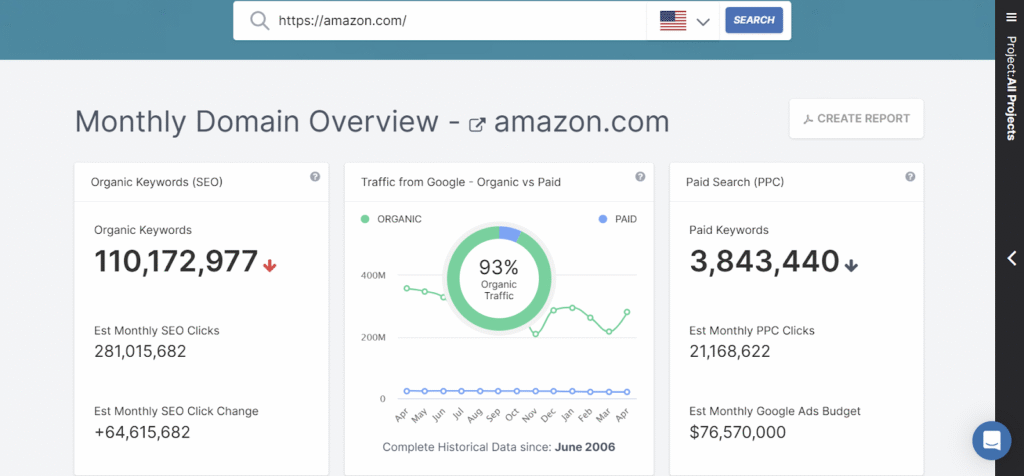
Key Features
- Keyword Discovery: Determine the keywords that your competitors are ranking for and bidding on, and discover their SEO and PPC strategies.
- Domain Comparison: Utilize tools like Kombat to compare domains and find useful keywords.
- Weekly Updates: Track keyword positions over time to measure the effectiveness of SEO activity and monitor changes in search engine rankings.
- Ad Copy Analysis: Examine your competitor’s historic data on ads, ad text, and landing pages to inform your own PPC planning.
- Ad Position Tracking: Track the ad positions of competitors over time.
Pros
- Unlimited Access: Unlimited data exports and searches come with all of their plans and enable comprehensive analysis without any data limitation.
- Flexible Pricing Plans: There are various price levels for various business sizes and requirements, from freelancers to large agencies.
Cons
- Learning Curve: It takes some time to learn and make the most of all the features.
- No Free Trial: There is no free trial from SpyFu, although they do provide a 30-day money-back guarantee.
Review
A budget-friendly PPC spy tool that reveals competitors’ ad histories beautifully. The interface feels slightly dated but delivers where it counts, especially for Google Ads research. Great for small businesses needing affordable, competitive intel.
4. Owler
A crowdsourced competitive intelligence platform tracking company news, funding alerts, and executive moves. It offers real-time updates on competitors through its community-driven database.
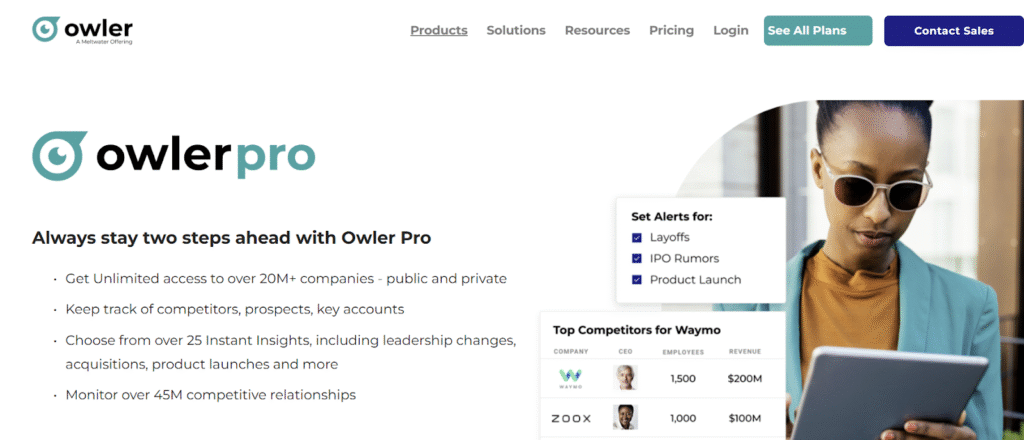
Key Features
- Company Profiles: Get information on 15 M+ companies, including revenue estimates, employee counts, funding, and industry data.
- Competitor Tracking: Automatically determines a firm’s both direct and indirect competitors.
- News Alerts: Get breaking news on a daily basis on the companies and industries you follow.
- Owler Pulse: Owler provides a master dashboard to track changes and insights about your competitors or partners.
- Crowdsourced Data: Get data from a group of millions of workers.
Pros
- Customized alarms: Get industry-specific customized alarms for dynamic industries.
- High-quality B2B information: Get high-quality B2B information that also includes organizational charts and company data.
Cons
- Limited Integration: Minimal integration option available with marketing or CRM applications.
- Inaccurate Data: Certain information provided might not be precise.
Review
A crowdsourced competitive intelligence platform with surprising accuracy. The free version offers great company alerts and funding news, though premium features require a subscription. Great for sales teams needing quick company updates, but lacks deep analytics. Ideal for startups watching competitors on a budget.
5. BuzzSumo
The go-to content intelligence platform for analyzing viral trends and competitor content performance. The tool helps reveal top-performing articles, backlinks, and social engagement across industries. Powerful for content marketers seeking data-driven ideation.

Key Features
- Content Analyzer: Locate the most shared content by social share, backlinks, or type.
- Trend Tracking: Monitor topics that are on the rise across the web.
- Discovery of Influencers: Discover journalists and influencers across different categories or domains.
- Alerts and Monitoring: The tool lets you trigger brand, competitor, or keyword alerts.
- Facebook and Reddit Analyzer: Track social media post reach and engagement as well.
Pros
- Content planning & viewing Trends: The tool is great for planning your content and viewing trends.
- Data-driven Filters: It also provides data-driven filters for your influencer and PR outreach.
Cons:
- Costly: The tool can be costly for teams that require several seats.
- Restricted in-depth SEO: There is a restriction on the in-depth SEO research.
Review
This tool is a content marketer’s secret weapon for viral content analysis. The social engagement metrics are incredibly useful, though they’re less helpful for non-content research. Perfect for content teams that need competitive inspiration.
6. Similarweb
Similarweb is a digital research leader that provides accurate traffic estimates and competitor website analytics. Uncovers referral sources, audience demographics, and engagement metrics. Offers market share comparisons across industries.
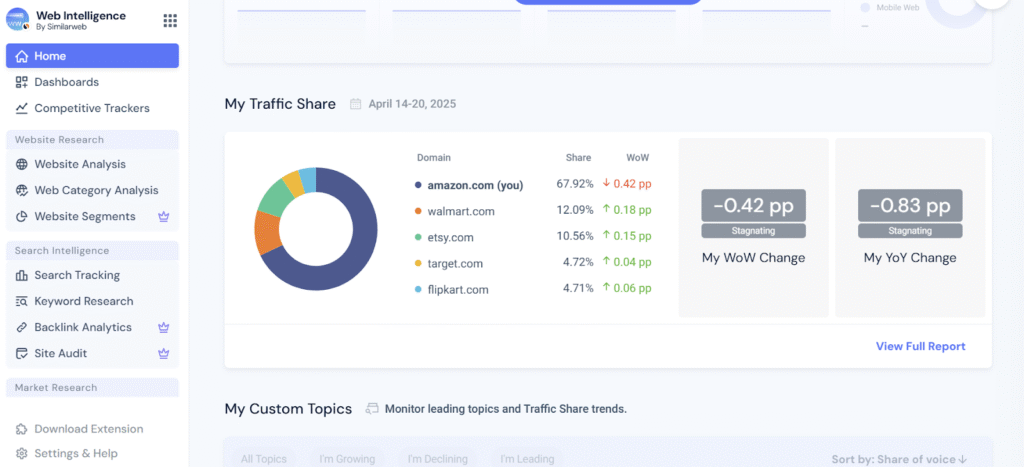
Key Features
- Web Traffic Statistics: View visits, sources, bounce rate, and session length as well for any site.
- Industry Benchmark: Analyze how your company compares to other competitors in the market.
- Audience Insights: Discover your visitors’ demographics and interests.
- Keyword and Referral Analysis: Monitor SEO/PPC performance, referral links, and ad networks.
- Competitive Funnels: See how your competitors convert and refer their customers.
Pros
- Traffic Accuracy: Get a high level of traffic accuracy at the page and domain level.
- User-friendly interface: The tool has a simple graphical user interface for quick data comparison.
Cons
- Costly: The tool might not be affordable for small businesses.
- Inaccurate data: The tool offers less accurate data for low-traffic or niche sites.
Review
This tool is a leader in traffic estimation with surprisingly accurate market share data. The audience insights are valuable for competitive analysis, though smaller sites may have less reliable data. Great for quick competitive benchmarking.
7. VisualPing
A website change detection tool that monitors competitors’ pages for visual and content updates. Sends instant alerts for pricing changes, product launches, or design refreshes. Simple to set up with no coding required.
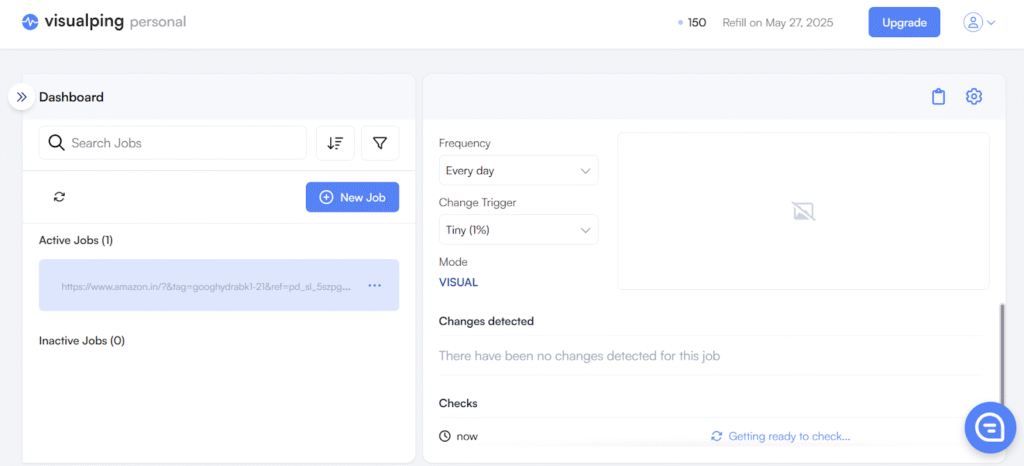
Key Features
- Website Change Monitoring: Easily track any changes on any website and get notified for the same via email, SMS, Slack, or Google Sheets.
- Visual & Textual Comparison: Receive before-and-after screenshots and highlighted text changes to assess any updates quickly.
- AI-Powered Alerts: AI detects any significant changes that reduce false positives and gives out only relevant notifications.
- Customizable Monitoring Frequency: Depending on your requirements, you can set monitoring intervals from every 5 minutes to daily.
- Team Collaboration: Invite your team members to manage and review pages that are monitored collectively.
Pros
- User-Friendly Interface: The tool has a simple user user-friendly interface and an intuitive dashboard.
- Wide Application: Useful for e-commerce, SEO, legal, journalism, and more.
- Flexible Notification Options: It offers multiple channels to create alerts.
Cons
- Limited Free Plans: The free plan offers basic features with less monitoring.
- No Advanced Analytics: Compared to what other competitors offer, VisualPing lacks in-depth data analysis tools.
Review
A simple but effective website change detection tool. The visual comparisons work well for tracking design changes, though they lack analytical depth. The tool is handy for monitoring key competitor pages.
8. Conductor
A powerful SEO assistant that brings enterprise-level competitive analysis directly to your browser. The extension delivers instant on-page SEO insights and content recommendations with impressive accuracy.

Key Features
- SEO Intelligence: The tool provides insights into keyword performance, content effectiveness, and competitor strategies.
- Content Optimization: It also offers recommendations to improve your content relevance and engagement.
- Website Monitoring: Helps track the health of the site and identify issues that might be affecting SEO performance.
- Custom Reporting: It generates customized reports in order to measure the success of your SEO and areas where it can be improved.
- Integration Capabilities: Easily integrate with various other analytics and marketing platforms for comprehensive data analysis.
Pros
- Comprehensive SEO Toolset: It has all the SEO tools, such as keyword research, content optimization, and site monitoring.
- Actionable Insights: The tool provides recommendations that are clear in order to improve SEO.
- Scalable Solutions: It is suitable for businesses of any size.
Cons
- High Cost: Pricing of the tool might be out of budget for small businesses.
- Complex Setup: There might be a learning curve during the initial setup that complicates the setup process.
Review
A powerful SEO assistant with impressive accuracy, though full functionality requires a paid Conductor account. Perfect for marketing teams needing real-time competitive audits, but smaller businesses might find the learning curve steep. Ideal for agencies already invested in the Conductor ecosystem who want to streamline their research workflow.
9. Ahrefs
The SEO professional’s choice for backlink analysis and keyword research. Features the industry’s largest live backlink index and accurate ranking tracking. Excellent for uncovering competitors’ link-building strategies. Also offers content gap analysis tools.
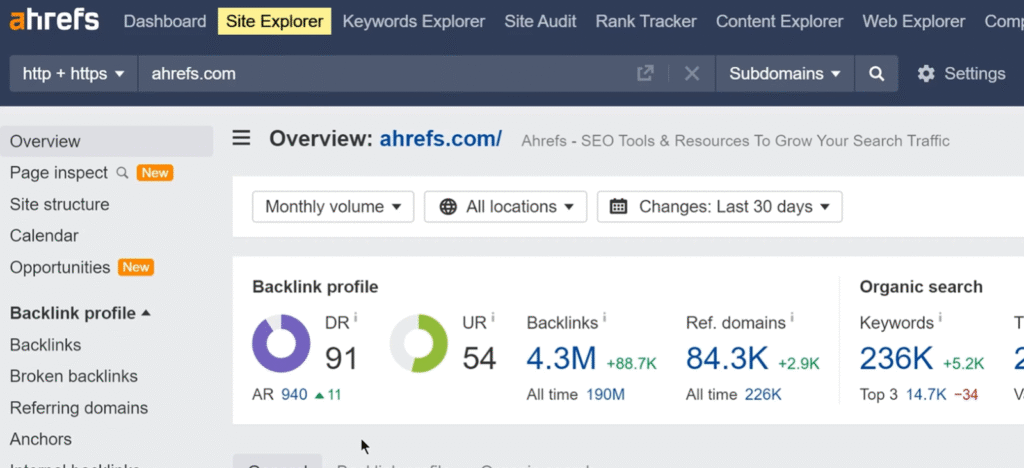
Key Features
- Site Explorer: Analyze backlink profiles, organic search traffic, and more with Ahrefs.
- Keywords Explorer: Discover ideas for keywords and access their potential.
- Site Audit: The tool lets you identify any SEO issues on your website and fix.
- Rank Tracker: Easily monitor how your website’s ranking improves over time.
- Content Explorer: Find content that is performing the best and analyse its success.
Pros
- Comprehensive Data: It offers extensive data for your SEO analysis.
- User-Friendly Interface: It has a user-friendly setup for easy navigation.
- Regular Updates: All the tools and features are frequently updated, helping you stay on top of everything.
Cons
- Pricing: Compared to some of its competitors, the pricing is on the higher side.
- No Free Plan: Ahrefs doesn’t offer a free plan; however, a free version is available for a limited time period through Ahrefs Webmaster Tools.
Review
An excellent tool for backlink analysis with incredibly accurate ranking data. Its site explorer provides unbeatable competitive intelligence, though the social media features feel tacked on. Ideal for serious SEO professionals who don’t mind paying premium prices.
10. SEMRush
A comprehensive marketing intelligence platform that covers SEO, PPC, content, and social media. Provides competitor ad history, organic search strategies, and traffic analytics. All-in-one solution for digital marketing and competitive research. Trusted by agencies worldwide.
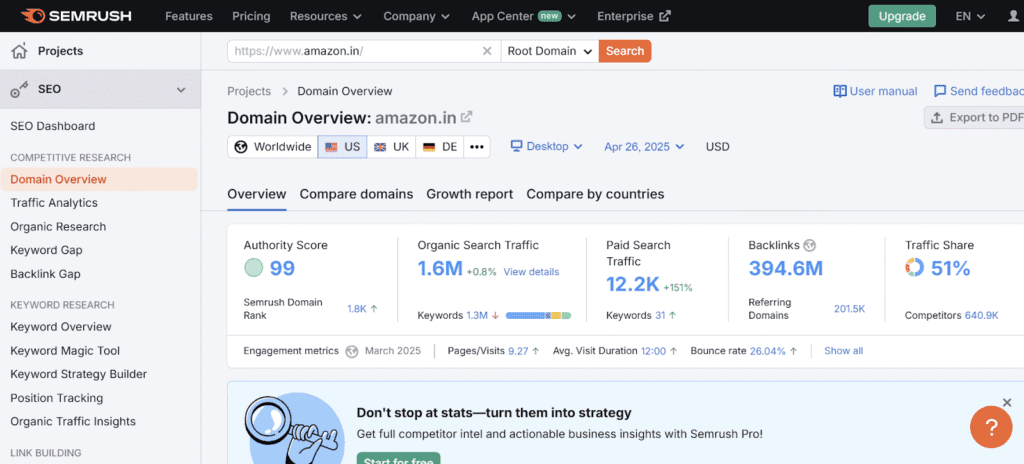
Key Features
- Competitor SEO Analysis: Monitor competitors’ organic search rankings, backlinks, and keyword strategy.
- Advertising Research: Review competitors’ paid advertising efforts, including Google Ads and display advertising. Content & Social Media Insights: track competitors’ content performance and social media activity.
- Market Explorer: Plot market share and competitive positioning. Traffic Analytics: Estimate user behavior and sources of website traffic for competitors.
- Keyword Gap Analysis: This is a step where you discover some keyword opportunities by diligently comparing your current strategy with others in the competition.
Pros
- In-Depth SEO and PPC Insights: This entails a detailed analysis of organic search methods, paid at campaigns, and other content marketing approaches.
- Huge Keyword Database: An astounding figure of more than 25 billion keywords has been painstakingly tracked and recorded.
- User-Friendly Dashboards: The tool has a user-friendly dashboard that offers easy reporting and visualization.
- Competitor benchmarking: This tool enables you to do a detailed comparison of a few competitors in a side-by-side manner.
Cons
- High Cost: The premium plans might not be affordable for small businesses.
- Steep Learning Curve: It might take a considerable amount of time and effort to master the advanced features.
Review
SEMRush is an amazing tool for SEO and PPC competitor analysis that is perfectly designed for large companies and agencies as well. However, the pricing of the tool might be out of the budget for smaller companies
11. Kompyte
Specialized competitive intelligence software that tracks real-time digital strategy changes. Monitors competitors’ websites, pricing, messaging, and promotions. Automatically generates sales battlecards from collected data.
Key Features
- Real-Time Competitor Monitoring: Track competitors’ site changes, prices, and promotions.
- Marketing & Sales Intelligence: Track competitors’ ad campaigns, messaging, and product offerings.
- Automated Alerts: Get instant alerts on every activity by the competition, such as the release of new landing pages or blog posts.
- Competitive Benchmarking: Compare performance metrics to industry standards.
- Battlecards: Develop detailed sales battlecards that establish the weaknesses as well as the strengths of your competitors in the marketplace.
Pros
- Real-Time Updates: Receive real-time updates on the activities of your competitors.
- User-Friendly Interface: Quick and seamless view with a simple dashboard that is easy to set up.
Cons
- Limited SEO and Social Media Analysis: The tool is more about pricing strategy and messaging strategy, and thus has limited SEO and social media analysis.
- Niche Use Case: The tool is best used for sales and marketing-focused teams, as opposed to being a general solution for comprehensive SEO analysis.
Review
A real-time competitive tracker that’s fantastic for monitoring product and pricing changes. The automated alerts save hours of manual research, though they lack depth in SEO analytics. Perfect for SaaS companies needing to stay ahead of market shifts.
12. Crayon
Crayon is a market and competitive intelligence software that is custom-built to help businesses track and analyze digital footprints in real time. This tool collects data from a vast range of sources, such as websites, social media, consumer reviews, and other sources, to provide actionable insights.
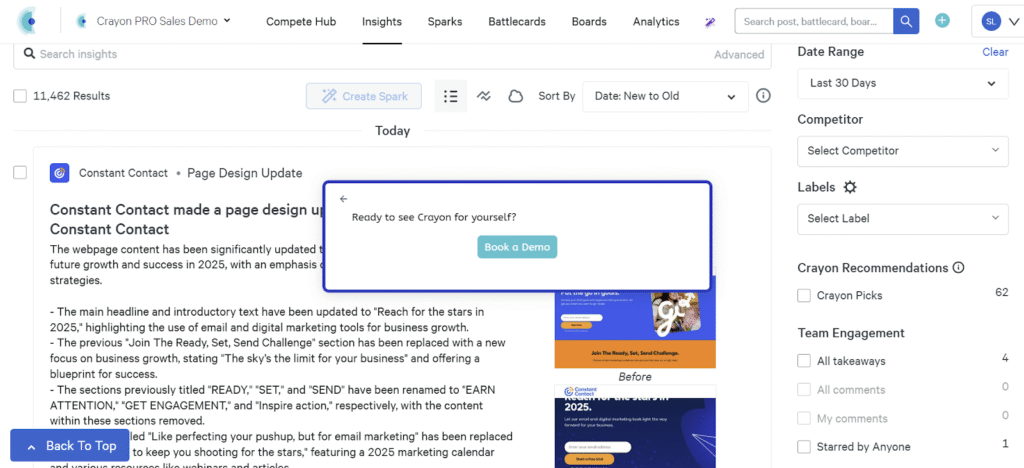
Key Features
- Competitor Monitoring: The tool tracks and analyses changes closely in different areas, like pricing tactics, product updates, changes in marketing tactics, and changes in messaging.
- Market Intelligence: Monitors industry trends, customer opinions, and new entrants.
- Battlecards and Alerts: This feature automatically creates detailed battlecards specifically customized for sales teams and sends timely alerts for any actions being taken by competitors in the market.
- AI-Driven Insights: Uncover trends and patterns from unstructured data.
- Content and SEO Monitoring: Track competitors’ blog posts, landing pages, and SEO strategies.
Pros
- Real-Time Updates: Constant tracking of competitors’ online behavior.
- Sales and Marketing Focus: This element enables teams to react quickly and effectively to the constantly changing developments that occur in the market environment.
- AI-Powered Analysis: This advanced process extracts rich meaning from large and diverse sets of data.
Cons
- Limited Free Plan: Enterprise pricing required in order to access additional features
- Excessive Data: Might need filtering to get valuable information.
Review
A great AI-powered market intelligence platform that excels at tracking digital footprint changes. The automatic battlecard generation is a sales team’s dream, but the data overload requires careful filtering. Best for enterprises with dedicated analyst teams.
13. Klue
Klue is a competitive enablement platform designed specifically to help businesses with the task of aggregating, organising, and disseminating useful competitive intelligence across teams. It focuses on sales enablement by turning your competitors’ data into actionable strategies.
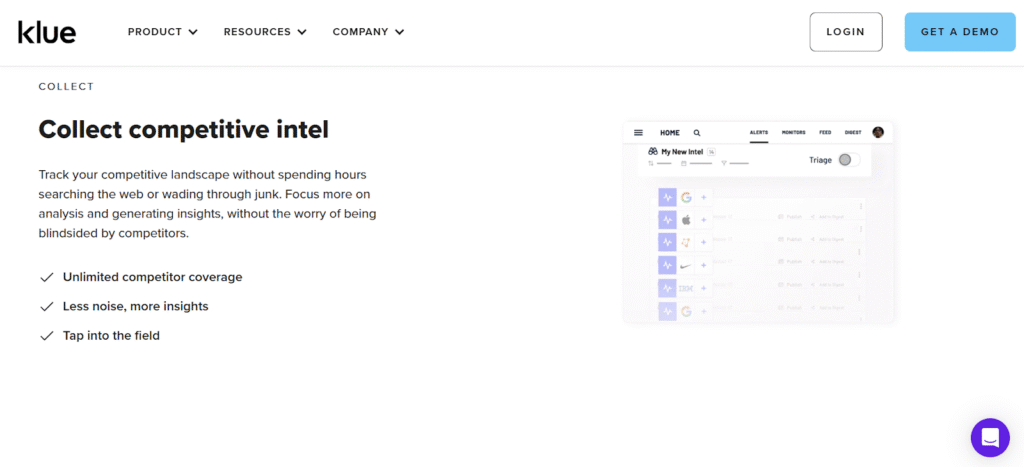
Key Features
- Competitor Profiles: Shared repository of competitor information.
- Battlecards & Playbooks: Develop interactive battlecards that sales teams can use to counter opponent assertions.
- Win/Loss Analysis: Monitors why the business is won or lost to the competition.
- Integrations: Compatible with Slack, Salesforce, and CRM software.
- AI-Powered Insights: It automatically updates competitor data.
Pros
- Sales-Focused: Responds well and counters competitors’ products and approaches.
- Collaborative Platform: Members can interact and exchange their ideas and valuable inputs with each other.
- Win/Loss Analysis: This activity provides useful strategic insights to enable a deeper understanding of deal performance and success
Cons
- Pricing Not Transparent: The pricing of the tool is not very transparent and requires custom quotes.
- Less SEO/Marketing Data: It focuses more on sales than on digital marketing.
Review
This is a competitive enablement platform that turns intelligence into sales-ready battlecards. The win/loss analysis features are incredibly valuable, though marketing teams might want more digital metrics. Ideal for B2B companies with complex sales cycles.
14. Phlanx
A simple tool calculating social media engagement rates for influencers and brands. Measures likes, comments, and shares relative to follower count. No-frills solution for quick performance benchmarking.
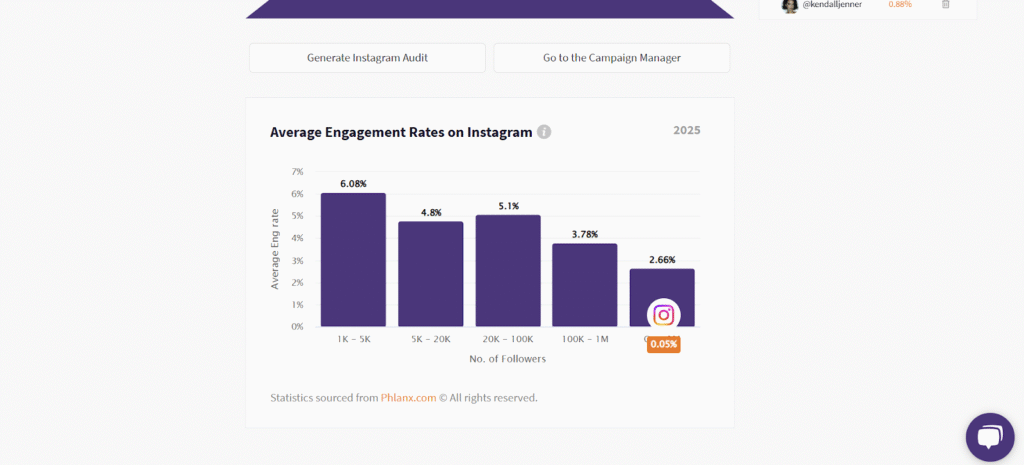
Key Features
- Engagement Rate Formula: Measures likes, comments, and shares as a ratio against followers.
- Influencer Comparison: Compare the engagement rates of various influencers.
- Free Tool: The tool is free to use and doesn’t require registration.
Pros
- Quick Engagement Check: The tool is especially useful when dealing with influencer marketing campaigns.
- Free and Simple to Use: There is no need for any complicated setup process.
Cons
- No Competitor Tracking: The tool only tracks engagement and not trends.
- Restricted to Social Media: The tool is specifically designed for social media, and there are no SEO or PPC insights.
Review
A tool that does one thing well, that is, calculating engagement rates. While it is extremely limited in scope, it’s perfect for quick influencer vetting. Great for PR teams needing simple metrics fast.
15. HypeAuditor
Well-known for its accurate influencer analytics and robust fraud detection capabilities, HypeAuditor is a widely preferred choice for marketers looking for transparency and reliability in their influencer partnerships.
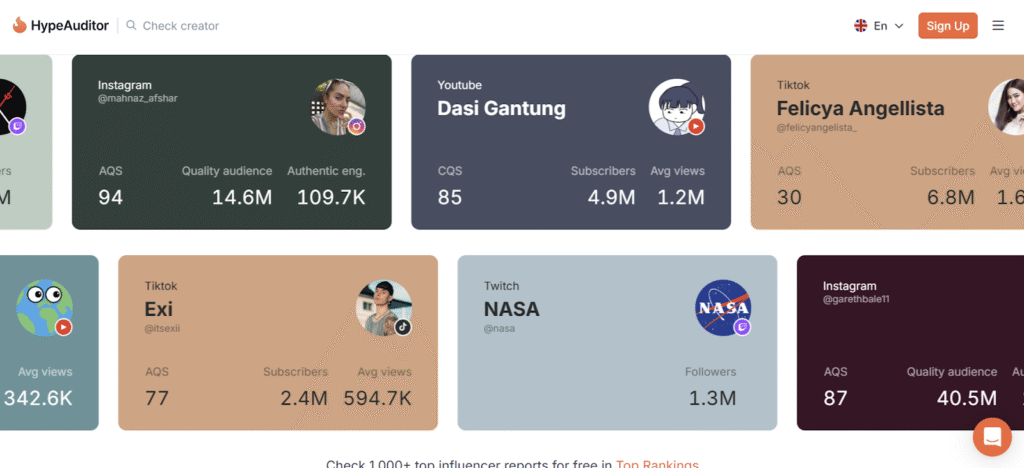
Key Features:
- Influencer Analytics: Analyse the social media influencers and gather statistics for any account and channel you like.
- Influencer Discovery: Search for Instagram, YouTube, and TikTok influencers across a database of over 137.5 million+ profiles using various filters for a customized match.
- Campaign Management: Easily manage and track Instagram and YouTube influencer campaigns with an intuitive tool.
- Media Plans: Create detailed media plans for influencer marketing campaigns on Instagram and YouTube.
- Trends & Rankings: Stay updated on trends coming up and successful influencers in various industries and countries.
- Competitor Analysis: Understand how your competitors execute their influencer marketing strategies, including budgets and performance metrics.
- Market Landscape: Compare the performance of influencer marketing campaigns across different brands and industries in specific countries.
Pros:
- Comprehensive Data: Gain access to a vast database of over 137.5 million influencers.
- Fraud Detection: Make use of advanced AI algorithms for detecting fraud within influencer accounts.
- Ease of Use: A user-friendly interface for managing campaigns effortlessly and analysing influencers.
- Market Insights: Gain valuable insights into various market trends and competitive landscapes.
- Media Planning: Efficiently plan and execute your influencer marketing campaigns on Instagram and YouTube.
- Campaign Monitoring: Track all of your campaign performances and adjust strategies needed for the best results.
Cons:
- Complexity: With a wide range of features, beginners might find it very overwhelming at the start.
- Learning Curve: It requires some time to understand all the tools and make the most of them effectively.
- Cost: Depending on the pricing structure, it may be expensive for small businesses or individual influencers.
Review
A trustworthy platform for influencer analytics and fraud detection. It’s perfect for brands that want transparency and data-driven decision-making.
16. Sprout Social
Sprout Social is a social media management pioneer that incorporates AI into an entire platform. With its suite of analytics, scheduling, and collaboration capabilities, it offers marketers one location to centralize. Sprout Social is aimed at simplifying social media management, addressing the main areas of scheduling, monitoring, analytics, and collaboration. With its single-platform architecture, it optimizes operations and offers users complete analytics and reportable capabilities.

Key Features
- Competitor Benchmarking: Compare your social media performance against competitors’ engagement rates, follower growth, and content strategies across platforms.
- Share of Voice Tracking: Measure how much online conversation your brand owns compared to competitors in your industry.
- Competitive Content Analysis: Identify competitors’ top-performing posts, hashtags, and content formats to inform your strategy.
- Ad Campaign Monitoring: Track competitors’ paid social strategies, including active promotions and estimated ad spend.
- Audience Overlap Insights: Discover shared followers between your brand and competitors, with demographic breakdowns.
- Industry Trend Tracking: Monitor emerging trends and how competitors are capitalizing on them in real-time.
- Sentiment Comparison: Analyze audience sentiment toward competitors’ brands versus your own.
Pros:
- Unified Platform: Combines scheduling, monitoring, and analytics in one place, simplifying the whole social media management process.
- In-Depth Analytics: Provides detailed insights into performance metrics, thus helping refine strategies for better results.
- Customizable Reporting: Allows users to create reports easily that are customizable and that align with specific business goals and KPIs.
Cons:
- Expensive for small businesses.
- Has a steep learning curve for new users.
- Limited automation for engagement and direct interactions.
Review
A solid AI-powered social media manager with top-notch analytics and scheduling. The interface is very smooth, but the pricing might not be affordable for smaller businesses, but great for brands that want deep insights and streamlined collaboration.
17. Wappalyzer
A lightweight technology profiler identifying competitors’ tech stacks. Browser extension reveals CMS, analytics tools, and frameworks instantly within a few clicks. Perfect for sales prospecting or technical competitive analysis. The free version covers basic detection needs.
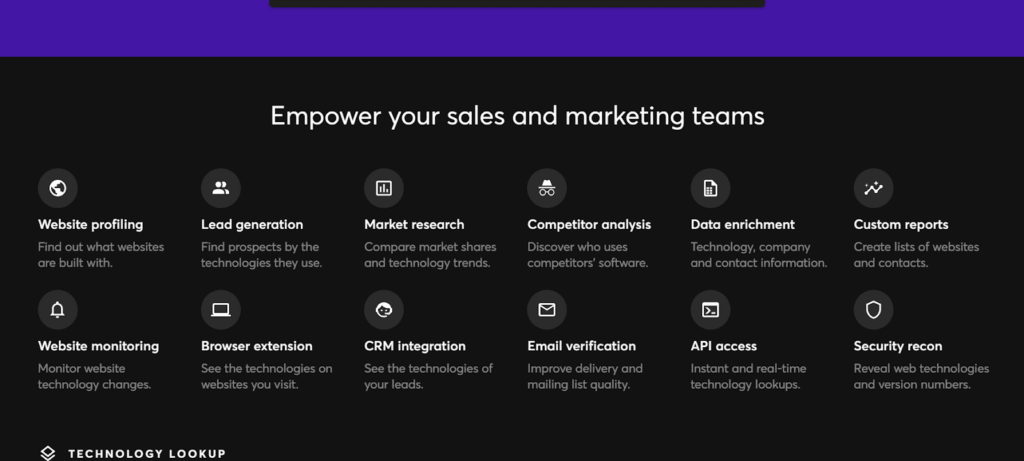
Key Features
- Technology Stack Detection: Detect competitors’ CMC, analytics tools, payment gateways, etc.
- Lead Generation: Acquire and identify firms that are employing specific technology stacks within their business.
- Competitor Benchmarking: Benchmark tech adoption among your competitors.
Pros
- Quick Tech Insights: The tool is one of the best in the market for marketers and developers as well.
- Totally Free Chrome Extension: It is very user-friendly and offers a completely free Chrome extension.
Cons
- Constricted Marketing Insights: The tool doesn’t offer insights on social media, PPC, or SEO data.
- Limited Basic Plan: The free plan available offers limited use, and only the paid plans offer advanced features.
Review
This is a go-to tool for instant tech stack identification. The browser extension makes competitive tech audits effortless, though it’s limited to just technology detection. Essential for developers and tech-focused marketers.
As we move deeper into 2025, staying ahead of the competition is about making better, faster, and more data-driven decisions. AI-powered competitor analytics tools are no longer an option but a requirement. Competitor analytics tools give you real-time data, automated audits, trend prediction, and assist you in determining content gaps. They enable you to be ahead of competitors in a clear and precise manner. Marketer, strategist, or business owner, leverage the correct AI tools to redefine the way you view and surpass your competition. Invest in the correct technology today, and be relevant, if not dominant, in your marketplace.
Check out our other blogs for more AI tools and insights
- Best AI Productivity Tools in 2024
- Best AI tools for Ecommerce
- 16 Ways Artificial Intelligence Can Be Used in Marketing in 2021
- Top 10 AI Agencies in 2024
- Top AI Courses To Master AI
FAQs
Yes, many AI tools like Sprout Social analyze competitor engagement, content strategy, and trending topics across social platforms.
Absolutely. Many tools offer scalable pricing and simplified dashboards that are ideal for startups and small businesses looking for insights without big teams.
With AI tools offering real-time monitoring, it’s best to set them up for continuous tracking while reviewing insights weekly or monthly, depending on your goals.
While highly reliable, no tool is 100% accurate. AI tools offer a close approximation and trends rather than exact figures, especially with traffic or revenue estimates.


